#chris taylor platoon
Explore tagged Tumblr posts
Note
Not to be terribly dark or nsfw for work here, but could you please write headcanons for cuddling with the platoon boys?
---
― Even though he hangs out with Elias' squad who are generally an affectionate bunch (far more so than Barnes's side of the platoon, that's for sure), thing is, I don't think cuddling comes that easily to Chris who possibly still has a bit of a suburban, classically midcentury notion on physicality and propriety that's pretty deeply ingrained in him, regardless how much he unlearned. Sure, a casual hug, pat on the back, squeeze of shoulders between compatriots, but actually laying down and holding someone really close? Not that he sees anything wrong with it, mind you, but in a really weird sense, ironically, Taylor might be most similar to Barnes than anyone else. Not that he knows it. Not that he'd ever admit to it. Heck, he'd probably get impassioned arguing against such an accusation. It's just that he's either awkwardly rigid and somewhat flustered, needing to be led into affection rather than outright giving it or he expects the other party to initiate it and for him to be the receiver after that initial hurdle is already crossed by you. Not that he doesn't like it. Might say he doesn't at first. In fact, he might very possessive of the notion of your touch as time moves on. It's just that first step? It's always hard to cross.
― O'Neill probably has a whole rambling ass theory in place how cuddling ain't for self respecting men and that it's something he's willing to do if nagged and nagged enough (Supposedly begrudgingly, emphasis on the 'supposedly' and only as a favor for you if you're tremendously insistent about it?) rather than it ever being done to him, except, behind closed doors, his head might be in your lap within two minutes flat and everything he's publicly said turns out to be entirely bogus and for show. It's all a typically O'Neill stunt for the masses, baby. See, there's a lot of empty, hot air around the things Red says and does most often, and if he plays this irritating, overly macho role, what happens privately might be entirely different. Truth is, man actually loves cuddles and he indulges in them like a whiny puppy might. It's genuinely therapeutic for him. He could be there nervously moping and complaining about something as he run your fingers through his hair while he rests his head on your knees and chainsmokes like someone who's life depends on it. It is legitimately (secretly) one of his favorite activities.
― Bunny's a demonic cuddlemonster, truly living up to his nickname. Except, he doesn't want it ever acknowledged that he is, you see. Officially, in the most derogatory sense he deems it as 'pussy shit' activity pretty vocally, but it's pussy shit activity he actually loves and thrives off of like someone absolutely addicted, going as far as preferring to be the one being cuddled, in fact. Being the little spoon. Being the one nuzzling over to you. Being the one held. Being the one with his head on your chest. Being the one who enjoys head pats and his hair being caressed. He's clingy. He's smothering. He's possessive. He's needy. He grasps and holds you back awfully tight, to the point of the contact tending to be painful and he could do this all day, yes and often times said excessive cuddling could be a prelude to sex or getting off, but even if it doesn't always lead to that (which is...rare) for someone talking as much smack about cuddling as Bunny might one could say he loves the whole notion more than anyone in his platoon.
― Rhah adores cuddling and he isn't afraid to be vehemently upfront about it to the degree he'd be transparent and even proud regarding the subject in front of the other boys too, being convinced that any self respecting man should wanna feel up his partner, touch them, squeeze them, please them and explore the contours of their body well and often --- a belief he holds to like it's religion; in fact, just how descriptive he gets with why he's very much for the gesture itself could get so accidentally erotic and sensual one might just feel they're interrupting something merely listening to Vermucci talk about it. Sounds a little like foreplay when he describes it. He might even start demonstrating how he does it by drawing out the contours of a body in thin air with his hands so everyone would get the general notion where someone likes being touched the most, being both passionate and almost seethingly aggressive at times as he does it and in practice, he's just as ardent in with cuddles as he is when he's merely chatting about it. Fact stands, man's a bear cuddler who smothers in love.
― Much like Rhah himself, King just doesn't understand people who don't wanna cuddle their significant other literally all day long and with relish and for all the world to see; he thinks there's basically something wrong with individuals like that. Like they're missing a couple of screws or something, denying themselves some of the profoundly most unspoiled joys of life on purpose, purely to show off to someone somewhere. But, who's gonna be impressed? That's right. No one! He doesn't subscribe to that repressive crap, as he calls it. He subscribes to loving and being loved, meaning that he wants everyone to know how much he likes physical affection, he wants everyone to see and shoot, if he they can envy him some for it too while he has the back of his gleeful, overly pleased head pressed up against your chest like a soft pillow to lean on, he wouldn't at all mind that either. Not his fault he knows how to live life good and if they took a lesson out of his book, they might just live life good too, is what he thinks.
― Wolfe might be so surprised by the prospect of cuddling he initially wouldn't know what to do or think about it, part of him wanting to immediately melt into it through instinct alone ---- the affection so new and unexpected it's almost something else entirely all while another part of him is there wanting to put up a masculine front so, as he'd hope, you'd be even more impressed with him and he'd come off like a serious figurative of authority who doesn't exactly need this but still concedes for your sake (truly considerate) so as a result he might just sit there, awkwardly smiling, repressing himself deliberately, acting the man, rigidly in place while you hold unto him. The truth is, he could jump out of his skin with affirmation and joy but he's playing a bit hard to get and it's killing him in actuality on the inside but he'd rather gnaw off his own foot than show it. Thing is, Mark could be so touch and attention starved it's hard to cope with all of it. If he actually acted how he truly wanted to act without any of the masks and nonsense he'd be a dufus who'd barely keep himself from smiling as he goes in for a hug. Can't have that.
― Lazy hammock lounging, sleeping in his arms, holding him or being held by him, playing with each other's hair, getting high together and dozing off in each other's embrace, tangled feet hanging off the edge of the bed or the sofa, pillowtalking for hours and hours or perhaps just looking at each other as you hug, Elias is the king of snuggling and nestling down as a concept and he's so free and generous with it he might just do it platonically as well as romantically, what's meaning to say one doesn't necessarily have to be with him to lay up in his arms --- he's shockingly giving like that. No prejudice in sight. If it feels good mutually then it feels good, so why deny the sensation of it? For all his nimbleness and how energized and active he is on field, in action, Elias could just as easily be as lazy as a sloth when he's in the right mindset and mood, not moving out of a state of cuddling with you for a full day, if need be, eating in your arms, snacking in your arms, smoking in your arms, being fed by you or feeding you, sleeping there and only getting up if absolutely necessary. Cuddling is less so something Elias merely does, as a result --- it's more like a lifestyle to him.
― Barnes doesn't cuddle, but he tactically leaves the terrain open for you to do it to him because he actually likes it deep down, he just makes no note of ever actually saying it because he doesn't think that's a thing that should ever be said, as rigid and stern as he generally is --- he doesn't want to 'depend' on something. Doesn't want to 'need' anything --- especially not a sensation that can be taken away afterwards, rendering him weak as a result; his presence is just there and if he's standing still and the setting is mellow enough to warrant physical closeness it stands to reason he's giving you a quiet signal to do it if you want to do it. But, thing is, in order to recognize said signals you have to know him exceedingly well first and foremost. Him, his body language, his eyes, what his eyes are trying to tell you, his expressions, the most unassuming gestures, which is to be expected for all he's concerned --- he wouldn't want anyone he who he doesn't know or who doesn't know him getting so personal with him anyway. That gateway is open. You're given leave. You just gotta walk through it. Barnes quietly allowing you to be that intimate is almost an unprecedented sign of trust.
#platoon#platoon 1986#platoon imagine#platoon imagines#platoon headcanon#platoon headcanons#platoon reader insert#platoon reader inserts#chris taylor#chris taylor x reader#chris taylor imagine#chris taylor imagines#platoon chris taylor#chris taylor platoon#robert barnes#bob barnes#robert barnes imagine#robert barnes imagines#bob barnes imagine#bob barnes imagines#robert barnes headcanon#robert barnes headcanons#bob barnes headcanon#bob barnes headcanons#elias grodin#elias platoon#platoon elias#elias grodin x reader#elias grodin imagine#elias grodin imagines
24 notes
·
View notes
Text
I said I'd never post on here, but I lied I've come to say hello Platoon and FMJ fandom have these abominations I have concocted on picsart at 3am (mainly Platoon bc that's my current fixation)













ALSO BBEFORE I GET CALLED A SLUR I DON'T ACTUALLY THINK BARNES AND ELIAS OR JOKER AND ANIMAL MOTHER ARE GAY FOR EACH OTHER, IT'S CALLED DARK HUMOR, LIBERAL/REF
#platoon 1986#full metal jacket#elias grodin#robert barnes#chris taylor#Private joker#animal mother#Rafterman#cowboy
29 notes
·
View notes
Text
Chris and Elias in Platoon (1986). A yap
(Alternatively- The homoerotic relationship between Chris and Elias)
Apologies if this is a little hard to understand, and if the photos are difficult to read
Feel free to comment with your own opinions, ideas or theories on all this
~~~~~~~~~~~~~~~~~~~~~~~~~~~~~~~~~~~~~~~~~~~~~~~~~~~~~~
So one of their earlier notable interactions is when Chris is shot and gets sent to hospital. (Which is not included in the movie) Lerner is there too but all he does is talk about his divorce
First he brings one of Chris’ book that he took when Chris was carrying way too much in the jungle walk (and fainting)
This scene in the movie is one of my favourite, not sure why. Elias basically offers to help him carry his stuff and pretty much makes an invitation for Chris to speak to him again and interact with him.
This is pretty easily readable as platonic, it’s a book, I think it’s a more personal gift though as he specifies it’s a book of Chris’ grandmother’s stories, but it’s never said if Elias knew this.
his other gift was one of Elias’ own purple hearts in a box, there’s a note addressed to Chris that says:
‘Taylor, take a close look at this thing. It's one of mine. Purple Hearts are made out of plastic, but they sure as hell ain't cheap! One is all you'll ever need.”
Again, this could be platonic depending on how you see it. But a war medal is a pretty big thing to gift someone platonically
____________________________________
Now, the underworld scene
First, it states Elias ‘leers’ at Chris. Typically, leering at someone is checking them out.
And after the leer, the shotgun scene commences. Chris thought that Elias wanted to shoot him (phrasing it “Blow him away” which is pretty funny to me)
Then he shotguns from Elias and it describes Chris feeling ‘a warm flush from his head to his armpits’, but I think that’s the weed
____________________________________
Next is one of my other favourite scenes. This is the ‘we’re gonna loose this war’ scene, but the novel has way more detail
So first off Elias grips his shoulders, keep in mind through this they’re both not high (from what I can tell with the context)
Then Chris notes a look in his eyes, describing it as ‘riveting yet demanding’ And ‘softened by a strange supplication’ Which I feel like is a very specific way to describe a man looking at you
[Supplication; the action of asking or begging for something earnestly or humbly.]
[Riveting; completely engrossing; compelling]
So they’re alone together in the middle of the night, and Elias is holding onto him and looking at him with a begging look. Riveting implies it’s compelling to Chris, which I took as Chris wanting to keep staring back.
Im not sure of ‘demanding’ but it feels in the same vain of ‘supplication’. A sort of plea?
Also mentioned is ‘There was an eerie flash in the man's eyes. It was deep .... back beyond the pupils where no one sees but anyone can feel.’
Which is just before the staring and after he grabs his shoulders, a flash of what is never mentioned, but I’m sure it means something
Then, Elias slowly moves his face closer and closer to Chris.
‘Chris froze and watched Elias's face as it moved slowly to within inches of his own. The move had been slow and determined, enlarging to fill his field of vision like a subject seen through a zoom lens.’
Which, is like something out of a romance movie. If Chris was a woman this would’ve been taken way different, when I read it I half expected them to kiss
‘He was reminded of the fierce glare Elias had used to halt Barnes in the ville.’
A fierce glare seems wrong for the situation. like Chris was mistaking some sort of intense stare for the angry glare he gave Barnes. This is backed up by the previous description of his staring, the ‘flash’ and the ‘supplication’
After that Elias says that ‘Maybe a piece of me's in you (Chris) now...’ and lets go of Chris who scoots back a bit. Then he smiles and decides he’ll come back as a deer (This is an important tool we’ll use later on)
Chris nods and ‘touched Elias lightly on the shoulder’ before getting up, but Elias grabs his hand’
It is never mentioned that Elias lets go of his hand
Again, if this was a woman and a man it’d be considered romantic. Chris mentions a shooting star
Then Elias tells him to go to sleep, and that’s the end of the charged scene
—
Now, the end of the book
It’s after the huge final battle, Barnes freaks out and loses it and Chris gets a bomb dropped on him.
He wakes up covered in alot of blood and sees this
‘a buck deer with mossy antlers and a snowy white bib tucked beneath his pointy chin. How could anyone with such soft, liquid eyes dispassionately rule the depths of hell? At the sound of roaring engines and creaking tracks, the deer lifted its ears, twitched its nose and bolted away into the brush. The animal moved with fluid grace, Chris noticed, as Elias had moved before Barnes killed him.’
First off, Chris describes the deer as lucifer. The devil, even though it’s implied to be Elias paying a visit.
Now if you really want to analyse it, I think you could look at it as Chris considering Elias a sin or something along those lines
‘How could anyone with such soft, liquid eyes dispassionately rule the depths of hell?’
Someone, not something like you would with an animal. Or, to me. ‘how could someone like Elias go to hell?’
With the context of the 60s/70s there’s a high chance he grew up religious, and especially being told homosexuality is a sin. But Elias showed up and apparently flipped it, he’s struggling with it. Elias gets killed and he thinks he’ll go to hell for his drug use or something along that line (and maybe his gay vibes idk) but then he thinks, how could someone as amazing as Elias go to an eternal fire pit, be tortured and all that.
It’s well known everyone loves Elias, he’s considered pretty friendly and all that. Not a stereotypical evil sinner
‘he decided the devil truly defied stereotype. Lucifer looked like a buck deer with mossy antlers and a snowy white bib tucked beneath his pointy chin.’
Now, this would seem like a pretty mystical sight. But Chris rejects it and decides that it’s the devil. Again, I’m not sure where I’m going here but it feels like it means something.
Then, the deer bolts. Just like how Elias ran from Barnes’ attack And Chris is rescued by the medical team or something of that sort (can’t remember the exact way they described them, but they help him)
And (a little after that) the movie ends.
Elias is long dead by then so we get nothing. Chris never sees his body or says goodbye to him, just a ‘I move faster alone’ (which, Chris doesn’t want to leave him alone. He wants to go with him, and he’s the one who wants to go back to get him or retrieve his body)
And he kills Barnes in revenge. He’d already fought him over it, he even wants to frag Barnes. Now we all know Barnes is a murderer and war criminal but ‘I’ll fight and eventually kill the much more experienced and stronger man for you’ seems like a lot. He could’ve reported Barnes and taken it through the court martialing (although that might not have worked) but he chose to revenge kill him.
for Elias.
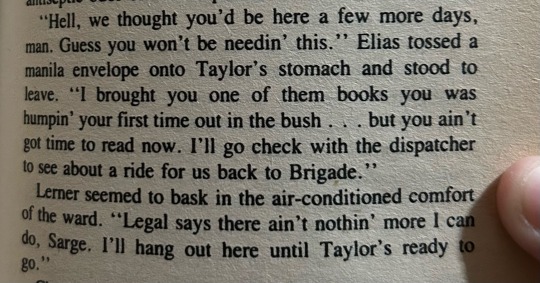
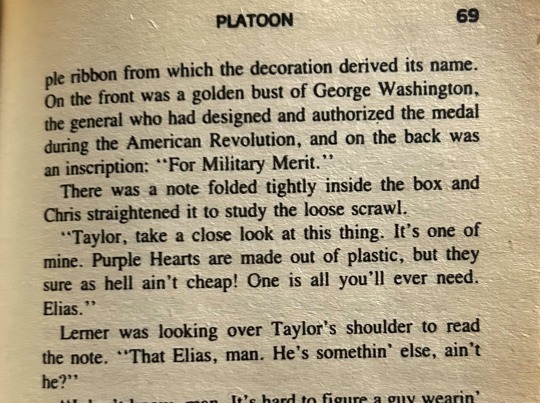
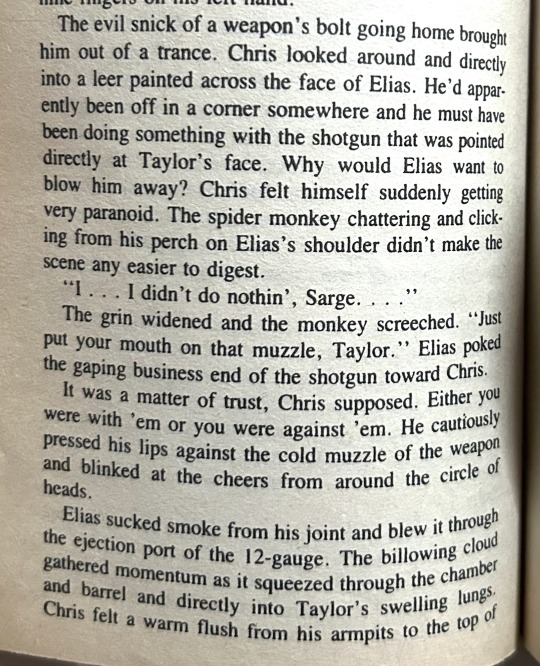
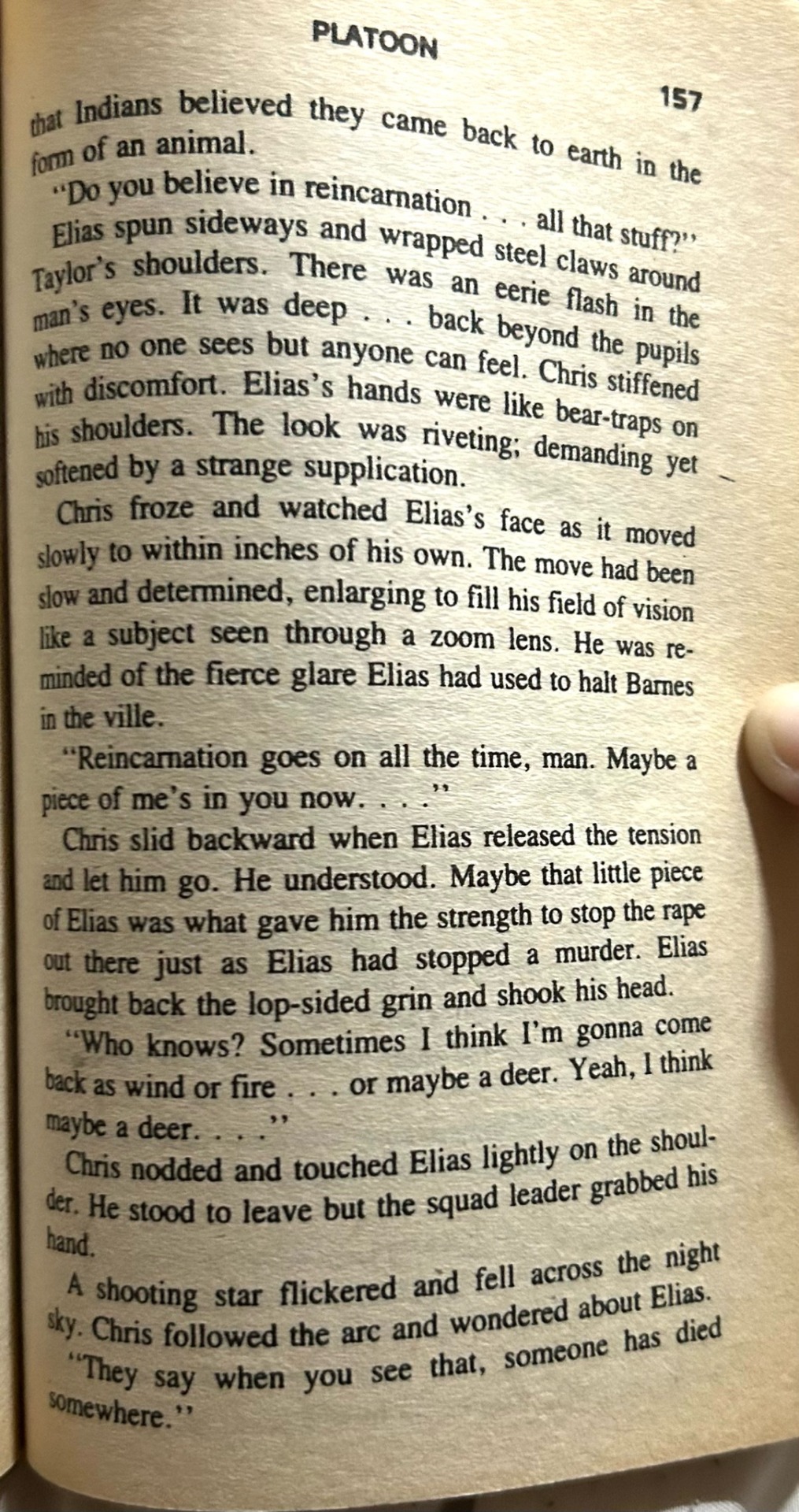

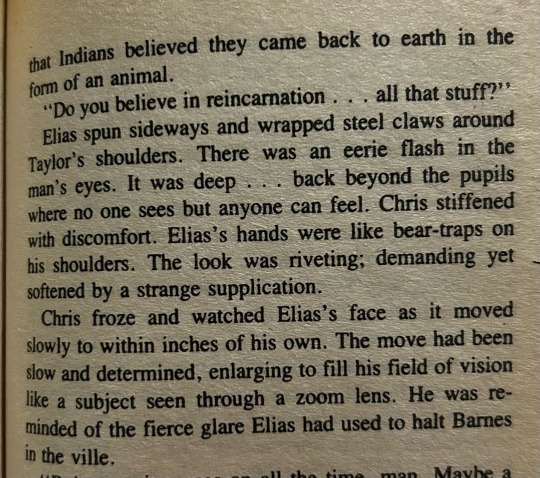
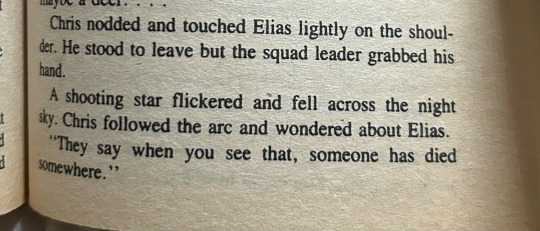
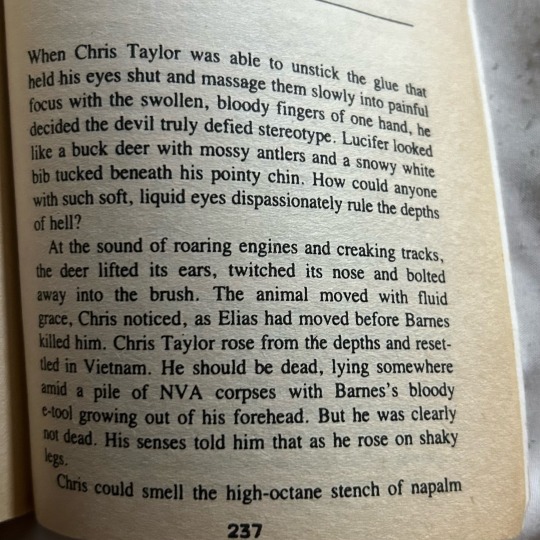
#platoon (1986)#platoon 1986#platoon#sergeant Elias#elias grodin#chris taylor#war movies#they’re gay your honor#rant post#yapping#essay#?#chrilias#chris and elias#willem dafoe#charlie sheen#movies#homoerotism#small fandoms#gay#gay men#lgbtq
19 notes
·
View notes
Text
Im sorry for this (im really not)
12 notes
·
View notes
Text
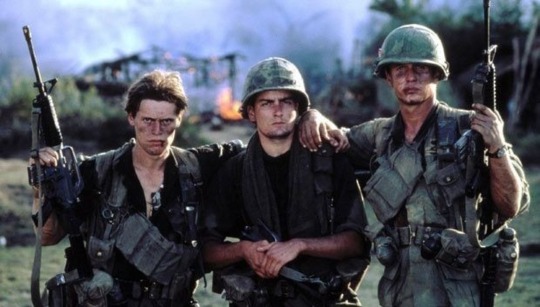

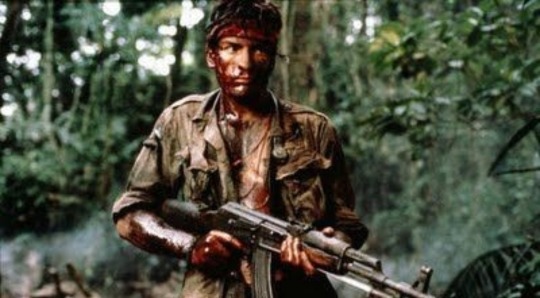

#i could make these all day#platoon 1986#chris taylor#elias#barnes#oliver stone#tom berenger#willem dafoe#charlie sheen#web weaving
45 notes
·
View notes
Text
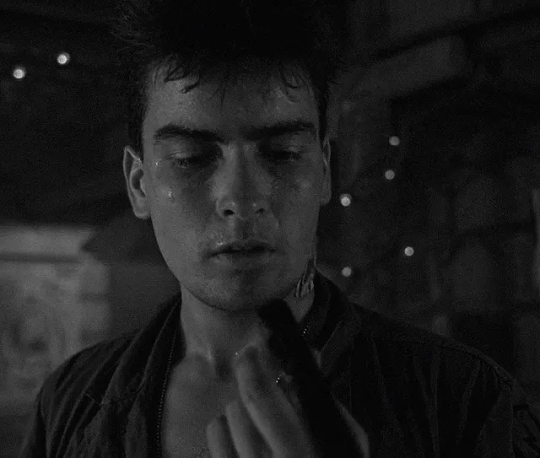
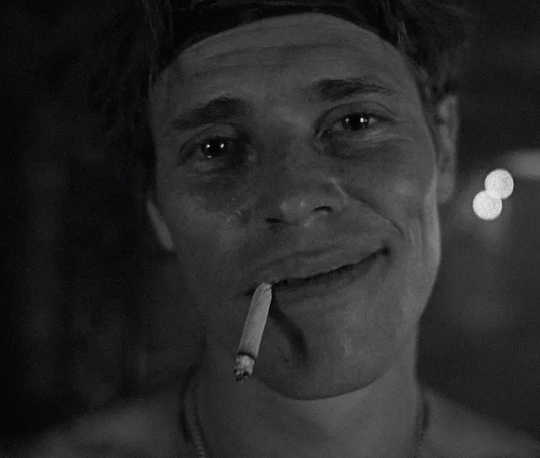

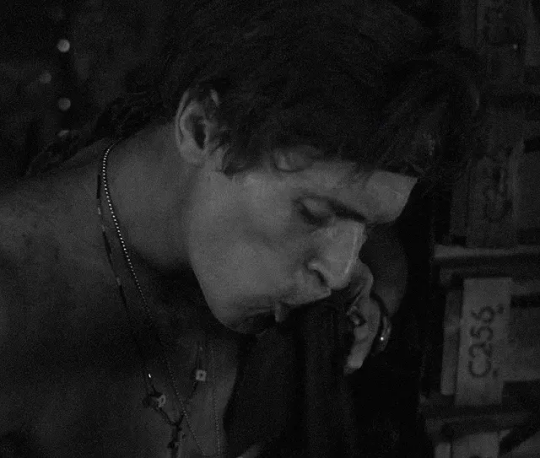
87 notes
·
View notes
Text
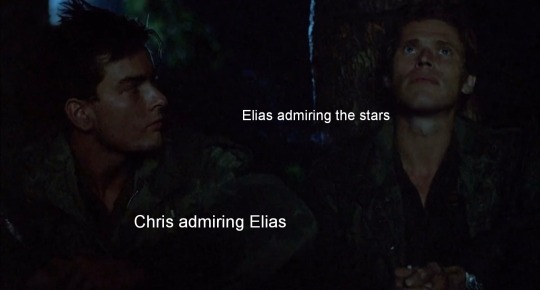
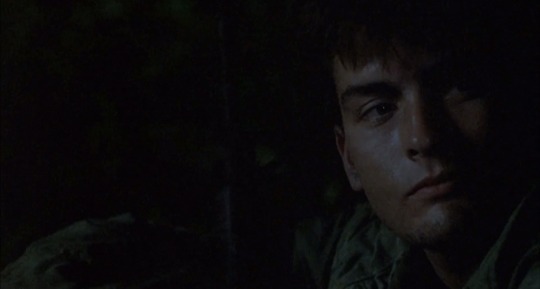
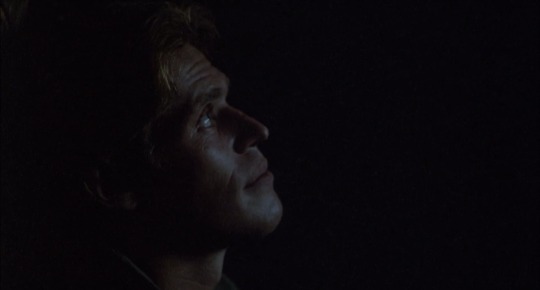
Chris full-on kept looking at Elias for the majority of this scene, whilst Elias obliviously stared at the stars.
#just to make it clear#this is not a ship post#chris looks up to elias#as a sergeant#hes really interested in what elias has to say#also i think chris really admired elias in this scene#i do too#elias grodin#✊️#⭐️#willem dafoe#charlie sheen#chris taylor#platoon#1986#stargazing#scene
28 notes
·
View notes
Text
LOOK WHAT MY ROOMMATE GOT ME!!! heehee teehee omg it's them omg they're really here!!!!
🫡 ✌️💪 🇻🇳 💞 🇺🇸
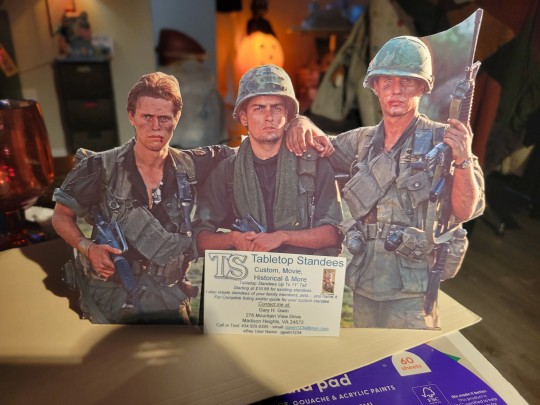
#platoon#sergeant elias#sgt elias#elias gordon#sergeant barnes#sgt Barnes#robert barnes#chris taylor#willem dafoe#tom berenger#charlie sheen#platoon 1986#army#vietnam war#vietnam#cant wait to wake up to this every morning#standee#cardboard standee
15 notes
·
View notes
Text
time and place, Taylor (pt. 1)

— Is anyone waiting for you at home? Eh, Taylor? — Elias handed him a cigarette, allowing him to take a last drag and hit the bottom, separating him from the unconscious with a thin wall.
— No, — the answer was followed by a pause, during which, as it seemed to Chris, he finally realized that "on the other side of life" was empty.
A thick shadow of chagrin lay on the relaxed smile. The cigarette butt from the cigarette, burning, smoldered between his fingers.
— My grandmother died a month before I left for Vietnam.
Chris's dilated pupils, increasingly filling the green iris, peered at one point in front of him. Dry lips lazily opened in an attempt to speak. One of them was broken, and drops of blood were oozing out of it, caked brown around the wound. Elias watched at Chris with narrowed eyes. His trembling fire of youth clashed with the incinerating oncoming fire of war. Unfitness would have ruined him in the first week, when he was carrying half of his fortune on his back. He needed a mentor next to him, who taught him how to cope with the internal oncoming fire. Chris's mouth was open as if in a silent scream, and his expression froze in glassy indifference, struggling with horror for possession of his soul. Someone else's fingers touched his chin, gently turning him to himself. To Taylor's surprise, there was no impulse to resist inside. Elias's face in such proximity made him remember that he was not alone in the room. He looked down, bumping into the sergeant's enticing smile. Sergeant only touched his lips, giving Taylor a moment to make a decision. Chris froze, allowing himself to be pulled into a kiss. But the rush of pain from the wound, which Elias unwittingly disturbed while clinging to him with fervor, made Chris stifle a hiss. He pulled away, touching the crack, from which a trickle of blood was already flowing. There was a taste of iron in his mouth, and smeared scarlet spots on his fingers. His face burned like after a good whiskey, and the sensation of sharp needles piercing his lip began to deliver. While the slow realization of what had happened did not overtake the excitement pleasantly filling his gut, Taylor felt a desire to continue what they had started. He couldn't read Elias' emotions, he kept it all deep inside, and it was never possible to say for sure. Awe and apprehension intertwined inside in a single impulse. But all this could not be more convenient now. He put his hand on Elias' neck, whose hot skin was already covered with perspiration.
— Did you like the taste of blood?
— Yes … sort of, — Chris was breathing heavily, and his broken voice gave him away, but he kissed with such a feeling as if he had gone mad.
The taste of dried blood mixed with fresh blood on his lips, tousled jet-black hair-everything about Taylor was too young, hot, eloquent for Elias. Chris himself craved more. Constant stress, fear of death and prolonged lack of sex increased tension, which he considered almost a vital necessity to relieve at the first good opportunity. And luck turned up for him. Luck with a tanned, freckled face that evoked associations with daring youth, and at the same time his rudely pointed features made it clear that Chris himself was not even younger. He put his palm on the sergeant's chest, which was heaving excitedly from the accumulated lust, but immediately felt a strong grip of someone else's hand on his wrist.
— Time and place, Taylor
#platoon#willem dafoe#elias grodin#chris taylor#charlie sheen#smut#80s#vietnam war#elias grodin × chris taylor
15 notes
·
View notes
Note
Could you please headcanons for Chris Taylor I am so addicted to that little white boy


---
― Taylor comes off as entirely vanilla and he might've been at one vague point in time, during his college days, sometime before the war, but after it he's the furthest thing from it humanly imaginable and he's almost like a living, breathing posterchild for how first impressions might very well be deceptive; in fact, it is safe to say Chris himself might be fully aware just how many paraphilias, fetishes, kinks and unconventional desires he brought home with him in the first place, to the point that if asked about what he likes, his answer might just be the bashfully indistinct and an unclear 'Oh, you know.' So, to get us off started as a bit off a prologue --- he seems like his sexual appetites are just as suburban, commonplace boy-next-door-ish as he appears to be, but that couldn't be further from the truth.
― Goes without saying that Chris developed a bit of a taste for having sex while high or simply under the influence; and thing is, you don't even have to actively participate yourself. It's neither a plus nor a minus if you do or don't, but he himself being the party that's high? This much is a given. Be it opioids, weed or something stronger, Chris might think that if being inside of you and with you feels good, being inside of you and with you while buzzed is like walking on clouds or downright fucking an angel --- and what's best, this is one of the safer, more mild fetishes he has in the long line up. You might be a bit of a frog getting slowly boiled in a kettle, perhaps think that, oh, well, your Chris is simply a bit adventurous. After all, former college boys and getting high goes hand in hand to the point it's almost a stereotype. Oh, but little do you know ---
― Bondage. You being on the receiving end, yes. Fact is, you two don't even have to actually reach the point where you're tied up with rope. Just the very idea of you and rope in the same sentence does it for him. You and said rope being in the same room? Enough to get him hard and all fidgety by sheer default. You genuinely being restrained? Chris is all mouth agape and dazed like the very sight took him to some dark place just at the mere sight of you; and fact is, he isn't some sort of proficient master at tying elaborate patterns or any of that crap. His skills are very utilitarian, though, like someone still learning. Fact is, you could be tied to the headboard with two very basic knots and gagged with the material of his, say, bandana, and it's just the most erotic thing he's ever seen.
― So, you might've thought the sex while high part could be considered commonplace and you might've thought the bondage is merely commonplace experimentation and then Chris Taylor pulls out a gun. So, yes; he has a major taste for fear. Seeing you afraid, watching your eyes get wide, observing your body as it backs away from him only to hit a corner, catching the actual dread seep into your facial expression, your trembling voice as you anxiously question him on what he's doing...oh, boy. Sure, we can in equal measure jot this down to gunplay but the truth of the matter is that it effectively boils down to terror and Chris having developed a taste for you knowing and understanding precisely the ways he changed after the war and being willing to show it to you as foreplay.
― Speaking of gunplay, yeah, suck on that. I mean it in the literal sense. Suck on it. Taylor's the type to whip out a firearm, have you kneel, maintain eye contact with him and genuinely put the barrel into your mouth, having you stroke it with your tongue no differently than you would do with his own dick; a gesture he possibly likes even more than, say, a casual, classic blowjob, not that he'd ever say that part out loud. Now, whether the actual weapon is loaded, unloaded, locked or unlocked is another topic entirely, but it is entirely easy to believe it is fully loaded and fully ready to go and something about you effectively pleasuring an object that represents all of his darkest, messed up impulses admittedly gets him going so badly that he could effectively cum harder from you being at gunpoint than from anything else.
― Sex while fevered, sick, sleepy, exhausted or injured --- something he is likely to do to you as much as he'd be on the receiving end of it, being something of a Somnophiliac with a taste for all things at least slightly tantric and esoteric, finding the act of fucking or having you ride him while he's dazed or plain out of it to be oddly illuminating or perhaps enlightening --- an almost near spiritual experience --- the little death in a very literal sense; something he indirectly picked up as a byproduct of him hanging out with the boys in the Underworld right along with his penchant for mixing sex and drugs, meaning that having you pleasure him, edge him, fuck yourself on top of him while he's disoriented in some shape, way or form is genuinely a fantasy he has (in fact, the movie script even has him dreaming about something similar.)
― Happy embarrassed girls. You know? The supposedly unassuming old timey pin up with her clothes ''accidentally'' caught in a piece of furniture, or the centerfold leaning down with her skirt slightly hiking up and smiling bashfully at being ''caught'' by the viewer? The type of semi-voyeuristic thing every soldier everywhere had hanging in his locker at least one point in time. The stuff of boyish daydreams. Chris lives for this sort of thing and probably had ever since before his college years, possibly being the first kink he ever developed in puberty. Stockings coincidentally ripped, a shy nip-slip you try to conceal or a wardrobe malfunction --- Chris gets his brain hazy over your being seductively, invitingly exposed and pretty darn content about it too. Puts him the right mood.
― Like a true son born of two fathers, if Chris picked up his occasionally fringe taste for sex with a mystical, borderline cabbalistic edge from Elias, it can be safely said that he just as likely adopted up his leaning towards going at it rough, dubious consent and dominance from Barnes himself, whether he knows it or not or whether he'd ever even fully admit to it (then again, maybe he would), because in either case, yeah, Chris would have developed everything ranging from a blood kink, a kink for cat and mouse games as foreplay, a fetish for the chase as a whole, authoritative play where he's the party in charge, hostage / hostage keeper scenarios, the need to subdue and going straight into things that can be considered Chris's own personal touch influenced by nobody with the likes of schoolgirl / schoolboy roleplay harkening back to his abandoned college days. Suffice to say, his tastes are surprisingly varied.
― To conclude, Chris Taylor is in many ways the definition of 'more than meets the eye' in every regard, including his sexuality and the more one digs, the deeper the rabbit hole of his desires gets. Sure, he seems like the type of rich kid who'd tremble at the notion of getting to second base at the back of a car parked car at a drive in theatre because that's just about the most sheltered, suburban notion of sex imaginable, but in actuality, Chris probably thought what it would be like if he watched you have sex with him and ten other guys while you're all buzzed out of your mind on opioids and fantasies like that are pretty much merely the tip of the iceberg with him. As the kids nowadays would say, he's a certified freak through and through.
#platoon#platoon imagine#platoon imagines#platoon 1986#chris taylor#chris taylor headcanon#chris taylor headcanons#chris taylor x reader#chris taylor imagine#chris taylor imagines#platoon chris taylor#chris taylor platoon
9 notes
·
View notes
Text
Banana Fish & Films PART 1
Recommendations based on aesthetics, themes, decade etc…

These are just my personal recommendations for movies similar to Banana Fish. Most of these films from 1960-90s revolving around some sort of street culture gangs, prostitution, trafficking, drugs all that good stuff…also a few of these I haven’t watched in years so the description may be a little off LOL
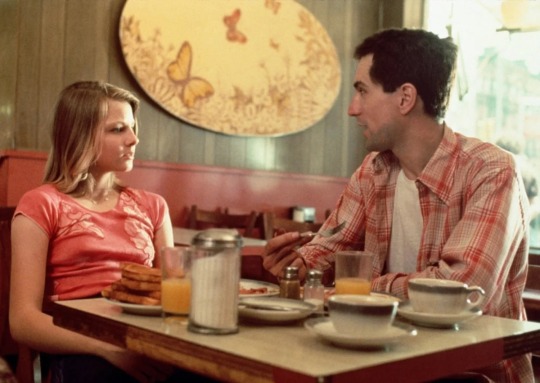
TAXI DRIVER 1976
“All the animals come out at night. Whores, skunk-pussies, buggers, queens, fairies, dopers, junkies. Sick and venal.”
Taxi Driver follows a former Vietnam solider insomniac 26-year-old Travis (Robert De Niro) who takes night shifts as a cab driver in NYC. The story is mostly told through his inner monologue, where he talks about his his loneliness and depression along with telling stories of his interactions with his customers. He crosses paths with a 12-year-old prostitute Iris, (Jodie Foster) whom he tries rescuing from her situation.
This film was recommended by Yoshida.
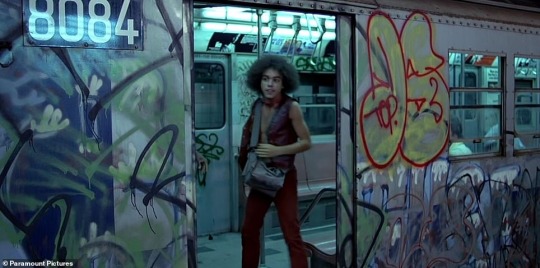
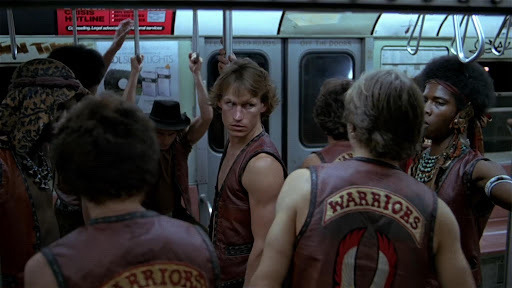
THE WARRIORS 1979
“Since when the fuck are you a diplomat?”
After being blamed for the killing of a rival gang leader in the Bronx, the Warriors have dozens of New York City street gangs are out for revenge battling over turf that ranges from Bronx to Coney Island where the Warriors reside.
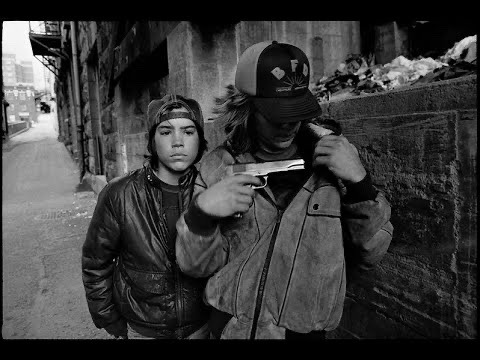
STREETWISE 1984
“No one to tell you where to go or what to do.”
A documentary on Street Kids in Seattle Washington 1984. Many of the teenagers do dangerous hustling gigs to survive on the streets.
There’s a story about a girl who is a prostitute with her mother’s knowledge, though her mother is against the idea she doesn’t stop her since it brings in money. Similar situation with Ash and his father..I have seen people say “I can’t believe his father would do that!” or that it’s totally unrealistic. Unfortunately these terrible things do happen, and even though Banana Fish is fictional and exaggerated, the crimes featured are really not far off for the time. Child exploitation human trafficking was huge, that’s one of the reasons how the milk carton missing persons started back in the eighties, especially through mafia/politicians in Europe.
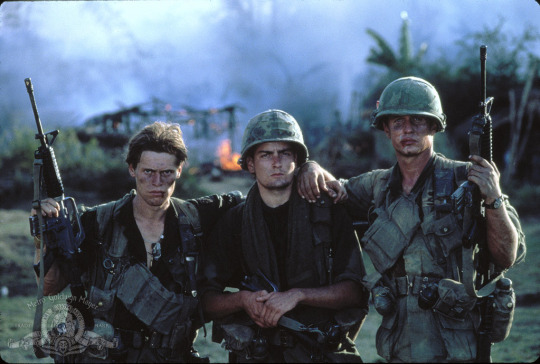
PLATOON 1986
“Any way you cut it, Barnes is a fucking murderer.”
This movie was recommended by Yoshida.
Chris Taylor (Charlie Seen) leaves university to enlist in the Vietnam war. His experiences in combat fades his idealisms of what war is really about and what the troops are fighting this war for. His two Sargents, Barnes (Tom Berneger) and Elias (Williem Dafoe) are constantly arguing together over their morals. Barnes has violent approaches and believes the villagers are harboring Vietcong, while Elias has a more sympathetic view of the villagers and the war. Their disagreements began putting soldiers up against each other, as well as the enemies.
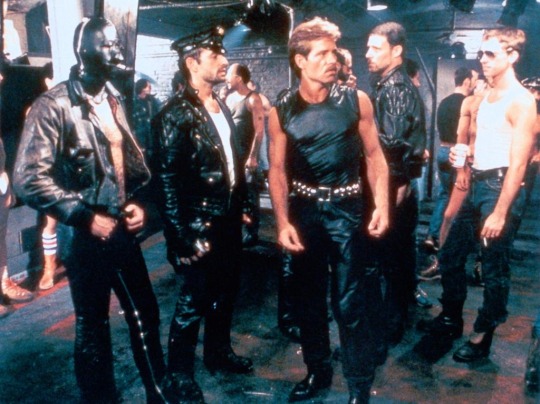
CRUISING 1980
“They told me that there was some... special assignment... and that I was right for it.”
Steve Burns (Al Pacino) is tasked to go undercover cop as a gay man infiltrating New York’s S&M clubs for a psychopath who’s been violently killing homosexuals. Steve begins immersing himself in the subculture and club hopping. While this is going down, he becomes increasingly distant with his girlfriend and the police forces homophobia becomes more apparent as the case goes on.
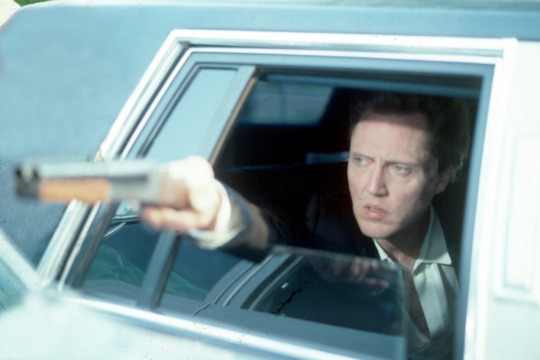
KING OF NEW YORK 1990
“ I spent half my life in prison. I never got away with anything, and I never killed anybody that didn't deserve it.”
The biggest Kingpin of the underground Frank White (Christopher Walken) just got released from prison. He’s different from most gangsters though. He shares his benefits with the poor, opening children’s hospitals and protecting the wellbeing of underprivileged citizens. Though the streets are much tougher than before. The mafia, Chinatown and Colombian gangs are running the streets partaking in child human trafficking and prostitution, unnecessary killings and racketeering. Frank’s not a fan of how they do business, and puts an end to it.
One of my favorites..the ending even ends similar to Banana Fish and there’s these two gay ass cop partners that the one kisses him towards the end (no spoilerrr) Frank is a super morally grey gangster and very similar to Ash in his beliefs. Film features many famous 90s actors. Must watch.
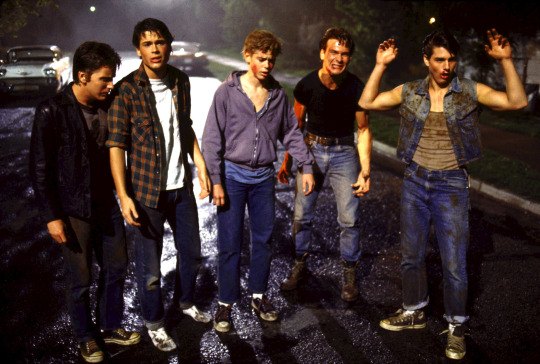
THE OUTSIDERS 1983
“I used to talk about killing myself all the time, man. But I don't wanna die now. It ain't long enough. Sixteen years ain't gonna be long enough.”
Based on the novel of the same name, an American classic most of us had to read in middle school.
A teenage gang in 1960s Oklahoma, the Greasers have constant clashes with another rival gang the Socs. When Ponyboy (C. Thomas Howell) and Johnny (Ralph Macchio) get into a brawl that leads to the death of a Soc member, they are forced to run away into hiding. With help from their friend Dally (Matt Dillon) he tells them a place out in the rural part of town they can hide until the situation dies down. They are eventually forced to return back to their town after a tragic incident with Johnny happens, and they’re subjected to the consequences of their violent lives once again.
#80s anime#80s manga#ash lynx#banana fish#eiji okumura#asheiji#internet archive#mitcharchivebf#akimi yoshida#90s manga#movies#movie review#80s movies#90s movies#gangster#film#crime#thriller
24 notes
·
View notes
Text




#yeah they break my heart btw#platoon 1986#elias#chris taylor#willem dafoe#charlie sheen#oliver stone#web weaving
18 notes
·
View notes
Text
“oh my god is true crime the only thing you like?!” no i also like platoon. Chris Taylor (Charlie Sheen) leaves his university studies to enlist in combat duty in Vietnam in 1967. Once he's on the ground in the middle of battle, his idealism fades. Infighting in his unit between Staff Sergeant Barnes (Tom Berenger), who believes nearby villagers are harboring Viet Cong soldiers, and Sergeant Elias (Willem Dafoe), who has a more sympathetic view of the locals, ends up pitting the soldiers against each other as well as against the enemy. In a scene from the movie Chris Taylor makes fun of a vietnamese guy with a disability.
Before the people in the house left, Bunny (Kevin Dillon) beats the guy to death. The movie ends with Chris Taylor all alone in jungle. While some might say “this movie is bad!!”, I believe that this movie shows you the brutality of war. Just like Apocalypse Now it takes place during the 70s. The 70s were a rough time. Safety concerns,The WaterGate cover up,Racial Conflict,etc. Some of the boys in war were just teenagers. Experiencing war crimes. Such young boys don’t need to go through that. They just started or almost started college, dying in war. This is why I believe that you should be at least done with college when you sing up to be in war. 😁.. #platoon #imveryfuckingretardedaboutit #tcc
3 notes
·
View notes
Text

Platoon(1986) behind the scenes photo
#platoon(1986)#platoon bts#behind the scenes#photo#willem dafoe#hes just casually smoking#charlie sheen#stargazing#scene#elias grodin#chris taylor#⭐️
42 notes
·
View notes
Text

Charlie Sheen as Chris Taylor
Platoon (1986)
15 notes
·
View notes
Text
Battleground Masculinity: Gendertroublers and Gatekeepers in Oliver Stone's Platoon (1986)
When Oliver Stone's autobiographically inspired war picture Platoon was released in the winter of 1986, it was one of the three movies that heralded a new era in the representation of the Vietnam war on the movie screen.1 Platoon set the tone for what was widely perceived as a realistic portrayal of the ordinary soldier's life in the war, a portrayal that refrained from inventing the Vietnamese as largely uncivilized and inhuman torturers, killers, and players of Russian Roulette and that took into account the cruelties and massacres occasioned by members of the United States armed forces. Time soon attributed its cover space to the movie and dubbed it "Viet Nam As It Really Was."2 Writer and director Oliver Stone was applauded for his sensitive and truthful account. The fact that his own tour of duty had inspired the film earned him the large-scale support of war veterans among the audience.
Yet Platoon is much more than a close-to-real-life depiction of a grunt's war experiences on the Vietnamese-Cambodian border. Due to its complexity as a cultural text, it is easily the one movie of its genre that has been most discussed and analysed in academia; having inspired well in excess of twenty scholarly articles on such issues as the film's Christian allegorical structure, the forces of good and evil, ritual and remembrance, the role of women, or colonialist subtexts in the film.3
Nevertheless, there remains a striking lacuna in the academic reflections on this culturally relevant filmic text, a blind spot that calls for attention.4 For while the homoerotic undertones of such homo-social genres as Western and war films have frequently been discussed, few movies have been engaged in negotiating the borders of the gender system as remarkably as Platoon.
Brief Summary
When young recruit Chris Taylor (Charlie Sheen) joins up with his unit in the Western part of Vietnam, he soon realizes that the platoon is split into two groups: the tough beer-drinkers and poker-players around Staff Sergeant Robert Barnes (Tom Berenger) and the music loving pot-smokers and dancers around Sergeant Elias Grodin (Willem Dafoe). Taylor finds himself oscillating between the toughness of Barnes and the moral integrity of Elias; and while he will come to incorporate traits of both, he is soon drawn into the den of the 'potheads.' Over the course of a few weeks, the platoon is involved in battle situations and actions of war several times, as it explores a booby-trapped bunker complex and loses some of its men; as the soldiers enquire about hidden weapons in a rustic village and come close to perpetrating a My Lai-type massacre; and as they are caught in an ambush and hit by friendly fire on patrol in the woods. Throughout these scenes, the animosities and rivalries between Barnes and Elias increase to the point where Barnes secretly murders his fellow soldier whom he perceives as a threat to successfully fighting and winning the war. In a furious climax, the platoon's position is overrun by VA forces and bombarded by the US Air Force. In the ensuing chaos, Chris takes revenge for Elias's death and shoots Barnes whom he has recognized as the responsible party. Injured, he is flown out of the battlefield.
War (Film) and the Feminine
It does not take much to realize that Platoon is doing without any female character of more than marginal importance. Where women appear at all, they figure as the victims of war atrocities and as sexual objects, or early on in the film as the absent receiver of the occasional letter home. Generally, though, Platoon presents a thoroughly male world where a lack of women is neither deplored nor, in fact, remarked upon. In the context of its genre, this consistent absence of female elements in narration and presentation is extremely rare. As has repeatedly been observed also in relation to the homo-social worlds of the generic Western movie, the occasional female character is important not only to slow down the narration and confront the male hero with moral and/or emotional conflicts; also, women characters are necessary in order to make sure that any sexual energy accumulating on the screen can find its place in socially indubitable heterosexual arrangements (cf. Esders; Neale).
Indeed, as Steve Cohan and Ina Rae Hark write in the introduction to Screening the Male (1993), "because the spectatorial look is so insistently male the erotic elements involved in the relations between the spectator and the male image have constantly to be repressed and disavowed" (3-4). Introducing a female character into the narration does, then, not only allow the (straight) male gaze to engage with a female form and avoid anxiety, it also helps disperse any doubts about the male heroes' sexual orientation and desires. Juxtaposed to a female object of desire, they smoothly assume their assigned places in a heteronormative society and are removed from the suspicion of homoerotic tendencies.5
At the same time, as philosopher Bar-On Mat-Ami has observed, especially in war films, women represent a 'rehumanizing power,' a moral force that counteracts the 'dehumanizing power' represented by the male. Where men kill and hurt and mistreat, women care and heal and cure. Without women's association with life, Mat-Ami argues, men, in their serious engagement with death, would not be able to come back home from the war and into their societies as whole human beings. If Platoon can do without any central female characters in its plot, she concludes, it is because the power to rehumanize is untypically attributed to a male character: Sergeant Elias.
Performing Masculinities, Differently
In fact, the two squads that the platoon is divided up into do not only stand for different choices of leadership and different preferences of night time entertainment; they also represent two different versions of masculinity.
On the one side, there are the 'Lifers' under the moral leadership of Sergeant Barnes: a predominantly Anglo-American circle whose members gather around beer, bourbon, and poker games. They share and enjoy heterosexual pornography and pride themselves in their physical strength. Bunny's (Kevin Dillon) proud display of his ability to bite a piece of aluminum from his beer can is one of the more curious proofs of excessive virile power. The atmosphere with the Lifers is sober as they sit in their well-lit tent, avoid physical contact with each other and preferably talk about sex and death. Barnes is the figurehead of their straight and no-nonsense masculinity: with his natural authority and self-denying courage he represents the classical, if not to say stereotypical, male hero. His association with weapons and his dedication to merciless fighting as well as his disfiguring scars6 clearly speak of his association with death and destruction.7 In the terminology of Mat-Ami, then, Barnes and the Lifers stand for a masculine, dehumanizing power. In the context of gender analysis, they represent a conventional, socially sanctioned and heteronormative way of being a man.
The pot-smoking 'Heads' around Elias, on the other hand, display a masculinity that is characterized by communal singing and dancing, by rituals of male bonding that involve uninhibited physical contact and a vague element of homoerotic seduction. Where the Lifers are basically passing time, the Heads' approach in their smoky, dimly-lit and altogether comfortable den is a considerably more dionysian one. The camera lingers on the naked, sweating bodies of dancers from different ethnicities and zooms in to a far greater closeness than it ever does with the Lifers. In this subtly homoerotic environment, Elias introduces stronger hints of queerness as he welcomes Chris into their community. Rather untypical of a courageous and responsible authority figure in a war movie, he acknowledges Chris's presence by waving at him, languidly reclined in a hammock, only half-clad, and sensually eating a banana. The ceremony of initiation that he performs later on with newly recruited Chris involves not only the passing of marihuana smoke through the phallic barrel of a gun but is also accompanied by a conspiratorial look and smile on the side of Elias and a somewhat curious yet disconcerted gaze by Chris – as though he were checking if anyone might watch and disapprove of this erotically charged moment. With its homoerotic overtones, the scene is strikingly reminiscent of the sexually coded passing of smoke through a straw in Jean Genet's gay prison art film, Un Chant d'Amour (1950), and it dissolves into a scene of soldiers relaxedly dancing with each other.
On the pictorial level, Elias's masculinity is coded as deviant and somewhat queer – especially in relation to the conventions of the genre. In excess of representing moral integrity, or, with Mat-Ami, the rehumanizing power in a dirty war, then, Elias might be considered to bear certain traits conventionally perceived as feminine: he is sensuous, emotional and caring, he promotes singing and dancing, and he cherishes romantic settings, as in the intimate conversation he has with Chris under a densely starred night sky with its obligatory shooting star.
Oedipal Structure
The film's distribution of characteristics traditionally conceived as masculine and feminine is underscored by the oedipal structure that governs the relationship among its three protagonists.8 When Chris is flown out of the battlefield, he ponders his experiences in Vietnam and observes: "I have felt like the child of these two fathers," Elias and Barnes. Given Mat-Ami's thesis, this would leave Elias in the position of the 'mother,' Barnes in the position of the 'father,' and Chris as the boy child of both. Indeed, the constellation between the characters repeats the traditional structure of desire, envy, and inclination to patricide developed by Sigmund Freud in Drei Abhandlungen zur Sexualtheorie (Three Essays on the Theory of Sexuality; 1905).
Chris and Elias soon develop a very strong bond that reverberates with a certain sexual desire (cf. the ritual of initiation discussed above). At the same time, Chris admires Barnes for his virility, his skill as a masculine, weapon-bearing leader. When, in what might be conceptualized as a primal scene, however, Chris realizes that Barnes 'fucks' with Elias, that he has in fact penetrated him with a projectile from a phallic gun, the symbolic son is rapidly possessed by the ardent wish to kill the symbolic father. By executing the patricide at the end of the film, Chris 'becomes' his father, he identifies with Barnes which enables him to dispose of the father and assume his position himself: "Only thing can get Barnes … is Barnes," Rhah (Francesco Quinn) observes in a preceding scene.
However, in a place like Stone's Vietnam, the Law of the Father does not go unchallenged, and rather than finding a stable place in the oedipal economy, Chris rises as a new brand of man, as the son of two fathers. He combines in himself the humanity and sensitivity of Elias and the toughness and violent relentlessness of Barnes. Achieving this feat, then, he does not only do justice to his oft-remarked upon association with Christ, heralding the advent of a new kind of man. Also, he follows the pattern of the classical Western hero's journey into the unknown, his confrontation with the moral darkness without and within him, and his ultimate rebirth as a more complete man, as one who can rightfully help construct a new and improved society.
Gatekeepers and Gendertroublers
The toting and wielding of the phallic gun – an instrument that, in the key scenes of the film, is presented as clearly ambivalent in its function in that it represents the possibility for both pain and pleasure – might be connoted with a certain jouissance.9 Nevertheless, the killings of Elias and Barnes are all essentially presented as jobs that need to be done, leaving the respective perpetrator disgusted, depressed, if not suicidal. Thus, after shooting Elias in the woods, Barnes resorts to getting heavily drunk. "I got no fight with a man does what he's told," he explains, "but when he don't, the machine breaks down, and when the machine breaks down, we break down. And I ain't gonna allow that."
Barnes, then, does not kill so much for the satisfaction of violent drives, but in order to guarantee the continuation of a system that he decidedly approves of. And just as he is prepared to take any necessary measure to win the war for his country, so he is ready to kill whoever provides a threat to the stability of the social machine that produces gendered – and straightly gendered – bodies for a heteronormative regime.10
"Elias is a troublemaker," Lieutenant Wolfe (Mark Moses) establishes at one point in the film – and indeed, Elias complicates and threatens to break up hegemonic gender structures. In addition to well-established elements of masculinity,11 his performance of being a man includes slippages, actions and ways of behavior that connote queerness and that do not quite fit into the heterosexual matrix. As he so frequently does in the film,12 Barnes takes responsibility in the face of these challenges to an established order and assumes the role of gatekeeper, of border patrol of the dividing line between morally sanctioned, 'correct' and deviant, 'wrong' performances of being a man. Elias, as an obvious threat to the heteronormative system, is punished in a way that exemplifies Judith Butler's observation that "we regularly punish those who fail to do their gender right" (1999: 178).13
In the case of Chris's murder of Barnes, things lie slightly differently: Chris doubts the prevailing system and wants to have it changed.14 "It's the way this whole thing works," he explains his lethargy after Elias's death. "People like Elias get wasted and people like Barnes just go on making up rules any way they want […]." For him, Barnes is revealed as (one of) the bearer(s) of a conformity proscribing system. Chris, however, has come to appreciate different ways of being and, under Elias's influence, has matured into a promoter of a far less restrictive gender system. So that eventually, Barnes himself has to die for his role and function in a system that might be about to come to an end as Chris surges from the ideological battlefield as the new, and more complete, man.
The 'child of those two fathers,' Barnes and Elias, Chris comes to integrate both their dehumanizing and rehumanizing powers. From Elias, he inherits tolerance and flexibility as much as the appreciation of the deviant and different; from Barnes, on the other hand, he takes the skills and abilities of the efficient gatekeeper. Returning home, one is bound to believe, Chris does not only carry the change that Vietnam has effected on him back into a United States society. Also, he might serve as both the constructor and the guard of a more flexible and comprehensive gender system, one that allows for deviantly doing one's gender and whose borders may, at the same time, be effectively defended against the infringement of delimiting and homogenizing forces.
Coda
Steve Cohan and Ina Rae Hark have remarked in relation to the "considerable force of the male in Hollywood cinema": "The scant attention paid to the spectacle of men ends up reinforcing the apparent effacement of the masculine as a social construction in American culture." Mainstream cinema, they claim, "screens out socially unacceptable and heterogeneous cultural constructions of masculinity" (2-3).
Platoon, while still offering itself as a realistic and authentically scripted representation of the Vietnam experience, does address as well as negotiate the construction of maleness in a heteronormative environment. The way that the film brings to the fore issues of masculinity and discusses the repressive forces inbuilt into any social system makes it stand out among mainstream films of any genre.
Christina Judith Hein, "Battleground Masculinity: Gendertroublers and Gatekeepers in Oliver Stone's Platoon (1986)," Current Objectives of Postgraduate American Studies, vol. 8, Mar. 2012
Endnotes:
1 The other two were Stanley Kubrick's Full Metal Jacket (1987) and John Irvin's Hamburger Hill (1987). Earlier films had presented the Vietnam war in the frame of a traditional Western plot (as did Ray Kellogg's and John Wayne's The Green Berets of 1968), as a psychedelic drug trip into the heart of moral darkness (Francis Ford Coppola's Apocalypse Now of 1979), or had primarily focused on the challenges that awaited both returning veterans and their home communities in the United States (the so-called homecoming films, with Hal Ashby's Coming Home of 1978, Michael Cimino's The Deer Hunter of the same year, and Ted Kotcheff's First Blood of 1982 as outstanding examples).
2 The issue appeared on January 26, 1987.
3 See the Works Consulted list at the end of this article for a complete account of scholarly articles on Platoon.
4 This essay is much inspired by the thoughts that Judith Butler has so poignantly formulated in her influential Gender Trouble: Feminism and the Subversion of Identity of 1990. It must be noted that Gender as well as Queer Studies have evolved considerably since the film's release in 1986, so that a critical look at the film and its negotiation of masculinities from today's perspective is warranted.
5 In the context of the productive power of censorship of speech in Excitable Speech: A Politics of the Performative (1997), Judith Butler remarks that "[i]n relationship to the masculine military subject, […] the norms governing masculinity will be those that require the denial of homosexuality" (131). The structural properties in films that center on homosocial communities and that portray a very conventional straight notion of masculinity (war films, Westerns, crime and mafia films) conform to this observation.
6 Over the course of his deployment in Vietnam, we learn, he has been shot and recovered seven times. Barnes is virtually deathless and can, as it turns out later on, only be killed by consent.
7 Or, as John Stone poignantly puts it: "Barnes could serve as the poster boy for anger" (82).
8 Freudian psychoanalysis and Hollywood mainstream narratives have existed in very close association, as has been remarked, among others, by Glen Gabbard. That entertainment film and psychoanalysis share the 1890s as their era of emergence in Western cultures is often taken to underscore their close connections. Interestingly, Sigmund Freud was himself approached by Samuel Goldwyn to collaborate on a love film about Anthony and Cleopatra, but he declined.
9 Again it is Bunny with his sadistic pleasure in the raid of the village who best exemplifies the excitement connoted with the use of a gun.
10 That Barnes should order Elias's men to "get back to church" when, in fact, he wants them to return to the specific ruin of a church where the platoon are regrouping, is telling in this context. His intention to get his soldiers 'back in line,' to get them to adhere to the doctrines of heteronormative gender conventions reveals itself in the grammatical slippage of his command.
11 It must not be overlooked here that in relation to conventionally approved performances of masculinity, Elias's way of being a man is excessive rather than deficient. His inclinations to queerness do not in any way stand in opposition to his qualities as an outstanding soldier but are complementary, additional. In this respect, Elias's gender performance combines a variety of differently coded traits, thus constituting an ever more subtle challenge to the fiction of a clearly discernible borderline in a binary gender system.
12 Barnes is invested in the film with the ability to see clearly through complexities and complications, and he is even credited by Chris as the man "at the eye of our rage – […] through him, our Captain Ahab – we would set things right again." Embodying the straight eye of the platoon's small-scope ersatz-society, it is Barnes's role and function to 'set things right again' where they have gone amiss. That he should draw from this strength and straighten out a queered gender order by disposing of Elias is therefore much in line with his character's setup.
13 It is important to note here, however, that whereas on the level of narration, Elias is punished for his deviant behavior, the film goes on to sanctify him, on the pictorial level particularly. The depiction of his death scene employs iconographic elements of a Christian tradition. Running from the woods and onto a clearing, pursued and repeatedly shot by enemy VA soldiers, Elias, like Christ under the cross, falls once, then twice. In a dramatic posture, he drops to his knees, flings his arms skywards, the film jumpcuts closer and closer to his face. Elias remains as in a position of crucifixion before the film further emotionalizes the sequence by repeating the moment of the last, deadly shot in slow motion. Samuel Barber's Adagio for Strings adds a note of tragedy as do the reaction shots to Chris who observes the goings-on from an elevated vantage point. Like Christ, one is bound to infer, Elias is sacrificed for a higher cause. The very sober execution of Barnes at the movie's end, mainly in full shot, stands in stark contrast to the spectacle of Elias's death. And while Barnes, tellingly, is killed after he has received a bullet wound uncomfortably close to the crotch, after an attack at his virility, that is, Elias maintains his queer position. As Laura Mulvey has noted in her influential essay, "Visual Pleasure and Narrative Cinema" (1974), it is usually the female figure that is turned into a "to-be-looked-at" spectacle on the screen – with the cutting up of her body by means of fetishizing close ups as a recurring stylistic device. Steve Neale, in "Masculinity as Spectacle" (1993), reads the violent intrusion on male bodies in war films as a way to mediate a desiring male gaze, to mark the male body as an erotic object that may be voyeuristically gazed at (16-18). In death, then, Elias evades the degradation and punishment that Barnes, in his role as gatekeeper of a heteronormative gender system, attempts to impose upon him, leaving open a number of queer strands.
14 As such, Chris himself becomes a part that does not 'function properly' and threatens to break down the machine that Barnes stands in for. The sergeant's battle crazed attempt at Chris's life just seconds before the final air strike might well be read in that vein. (On the moral plain, this scene establishes a connection between Barnes and a certain demoniacal force. Beside himself with rage, red-eyed, and ready to kill, he raises his arms in a way vaguely recalling Elias's death scene. The fiery and hellish lighting behind him, however, underscore an association with evil, as he is about to smash in Chris's head with a shovel. The opposition between Barnes and Elias is clearly stressed by these moments of Christian and Satanic contextualisations).
Works Cited
Butler, Judith. Excitable Speech: A Politics of the Performative. New York: Routledge, 1997.
—. Gender Trouble: Feminism and the Subversion of Identity. New York: Routledge, 1999.
Cohan, Steven and Ina Rae Hark. "Introduction." Screening the Male: Exploring Masculinities in Hollywood Cinema. Ed. Steven Cohan and Ina Rae Hark. London: Routledge, 1993. 1-8.
Esders, Karin. "The Return of Femininity: Romance and Reminiscences in the Western Film." Popular Culture in the United States: Proceedings of the German-American Conference in Paderborn, 14-17 September 1993. Ed. Peter Freese and Michael Porsche. Essen: Die Blaue Eule, 1994. 235-43.
Freud, Sigmund. Drei Abhandlungen zur Sexualtheorie. Wien: Deuticke, 1947.
Gabbard, Glen O. "The Psychoanalyst at The Movies." International Journal of Psycho-Analysis 78 (1997): 429-34.
Halberstam, David. "Platoon: Viet Nam As It Really Was." Time Magazine 26 January 1987: 54-62.
Mat-Ami, Bar-On. "Platoon and the Failure of War." Sexual Politics and Popular Culture. Ed. Dyane Raymond. Bowling Green: Popular P, 1990. 211-18.
Mulvey, Laura. "Visual Pleasure and Narrative Cinema." 1974. Film and Theory: An Anthology. Ed. Robert Stan and Toby Miller. Molden: Blackwell, 2000. 483-509.
Neale, Steve. "Masculinity as Spectacle: Reflections on Men and Mainstream Cinema." Screening the Male: Exploring Masculinities in Hollywood Cinema. Ed. Steven Cohan and Ina Rae Hark. London: Routledge, 1993. 9-20.
Platoon. Dir. Oliver Stone. USA, 1986.
Stone, John. "Evil in the Early Cinema of Oliver Stone: Platoon and Wall Street as Modern Morality Plays." The Journal of Popular Film and Television 28.2 (2000): 80-87.
Un Chant d'Amour. Dir. Jean Genet. F, 1950.
Works Consulted
Bates, Milton. "Oliver Stone's Platoon and the Politics of Romance." Mosaic: Journal for the Interdisciplinary Study of Literature 27.1 (1994): 101-21.
Beck, Avent Childress. "The Christian Allegorical Structure of Platoon." Screening the Sacred: Religion, Myth, and Ideology in Popular American Film. Ed. Joel W. Martin and Conrad E. Oswalt Jr. Boulder: Westview Press, 1995. 44-54.
Christopher, Renny. "Negotiating the Vietnam War Through Permeable Genre Borders: Aliens as Vietnam War Film, Platoon as Horror Film." LIT: Literature Interpretation Theory 5.1 (1994): 53-66.
Dalton, Mary and Jarrett Steve. "Platoon: The Fiction of History." Creative Screenwriting 3.2 (1996): 19-30.
Doyle, Jeff. "Missed Saigon: Some Recent Film Representations of Vietnam." Crossing Cultures: Essays on Literature and Culture of the Asia-Pacific. Ed. Bruce Bennett, Jeff Doyle, Satendra Nandan and Loes Baker. London: Skoob, 1996. 91-99.
Ecker, Michael. "Vietnam in the Genre Film: Essential Vocabulary of an Imaginary Hollywood File on Various Devices Expedient for the Success of (War) Movies." Modern War on Screen and Stage / Der moderne Krieg auf der Bühne. Ed. Wolfgang Gortschacher and Holger Klein. Lewiston: Mellen, 1997. 163-78.
Halberstam, David. "Platoon." Oliver Stone's USA: Film, History, and Controversy. Ed. Robert Brent Toplin. Lawrence: U of Kansas P, 2000. 110-19.
Hedges, Andrew. "Inter(Active)Textuality: An Examination of Platoon as a Film and as a Simulation Game." Kodikas 14.1-2 (1991): 175-83.
Helt, Richard C. "Kulturkritik or Anti-Americanism? The Reception of Recent Popular American Cinema in West Germany, with Special Focus on Platoon." Journal of Popular Culture 25.3 (1991): 189-97.
Hilbish, Melissa. "'Isn't It Just a Movie': Lessons Learned from Oliver Stone and Platoon." Reader: Essays in Reader Oriented Theory, Criticism, and Pedagogy 38-39 (Fall 1997 – Spring 1998): 42-62.
Jeffords, Susan. "Masculinity as Excess in Vietnam Films: The Father/Son Dynamics of American Culture" [with a reply from Claudia Springer]. Genre: Forms of Discourse and Culture 21.4 (1998): 487-522.
Kinney, Judy Lee. "Gardens of Stone, Platoon, and Hamburger Hill: Ritual and Rememberance." Inventing Vietnam: The War in Film and Television. Ed. Michael Anderegg. Philadelphia: Temple UP, 1991. 153-65.
Klein, Michael. "Historical Memory, Film, and the Vietnam Era." From Hanoi to Hollywood: The Vietnam War in American Film. Ed. Linda Dittmar and Gene Michaud. New Brunswick: Rutgers UP, 1990. 19-40.
Large, Ron. "Platoon: Fear, Loathing, and Salvation in Vietnam." Journal of Evolutionary Psychology 11.1-2 (1990): 116-23.
Lichty, Lawrence W. and Raymond L. Carroll. "Fragments of War: Platoon (1986)." American History / American Film: Interpreting the Hollywood Image. Ed. John E. O'Connor and Martin A. Jackson. New York: Ungar, 1988. 273-87.
Palmer, William J. "Symbolic Nihilism in Platoon." America Rediscovered: Critical Essays on Literature and Film of the Vietnam War. Ed. Owen W. Gilman Jr. and Lorrie Smith. New York: Garland, 1990. 256-74.
Porteous, Katrina. "History Lessons: Platoon." Vietnam Images: War and Representation. Ed. Jeffrey Walsh and James Aulich. New York: St. Martin's, 1989. 153-59.
Ringnalda, Donald. "Unlearning to Remember Vietnam." America Rediscovered: Critical Essays on Literature and Film of the Vietnam War. Ed. Owen W. Gilman Jr. and Lorrie Smith. New York: Garland, 1990. 64-74.
Schechter, Harold and Jonna G. Semeiks. "Leatherstocking in 'Nam': Rambo, Platoon, and the American Frontier Myth." Journal of Popular Culture 24.4 (1991): 17-25.
Schneider, Tassilo. "From Cynicism to Self-Pity: Apocalypse Now and Platoon" [with replies from Anthony R. Guneratne and Terry Dibble]. Cinefocus 1.2 (1990): 49-59.
Taylor, Clyde. "The Colonialist Subtext in Platoon." From Hanoi to Hollywood: The Vietnam War in American Film. Ed. Linda Dittmar and Gene Michaud. New Brunswick: Rutgers UP, 1990. 171-74.
#oliver stone#platoon#scholarly articles#academics#journals#academia#gender in platoon#gender studies#lgbt studies
4 notes
·
View notes